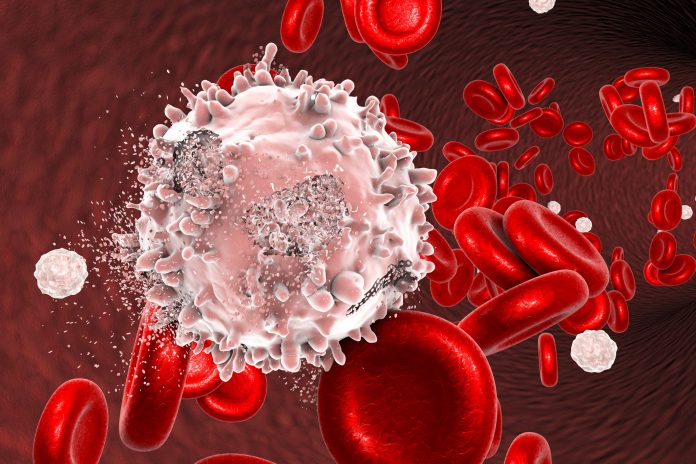
Syndax’s revumenib showed promise in advanced acute leukemias with KMT2A rearrangements or mutant NPM1, according to findings from the Phase I AUGMENT-101 trial published this week in Nature.
Formerly SNDX-5613, revumenib is an oral small-molecule inhibitor of the menin (MEN)-KMT2A interaction. Another study this week, also in Nature, explained the how MEN1 mutations play a key role in leukemia.
“Acute leukemias with KMT2A rearrangements are difficult to treat and NPM1 mutations are the most common genetic alteration in acute myeloid leukemia. These subsets have no specifically approved targeted therapies,” said AUGMENT-1 study lead Ghavas Issa, MD, assistant professor at The University of Texas MD Anderson Cancer Center.
“The responses in this trial show that menin inhibitors may be a promising treatment option that is well tolerated by patients and could be the newest addition to successful targeted therapies for acute leukemia,” he added.
The MD Anderson team that ran the trial found that, among 60 patients studied, the overall response rate to revumerib was 53% and complete remission or complete remission with partial hematologic recovery was 30%, with 78% of patients achieving clearance of measurable residual disease. Responses were seen across multiple dose levels.
These results were first presented at the 2022 American Society of Hematology (ASH) Annual Meeting.
“These response rates, especially rates of residual disease clearance, are the highest we have seen with any monotherapy used for these resistant leukemia subsets,” Issa said.
In KMT2A-rearranged or NPM1-mutant acute leukemias, the interaction of the menin protein with KMT2A is a key driver of expression of leukemia-promoting genes. Leukemias with KMT2A rearrangements occur in infants, children and adults, and NPM1 mutations are the most common genetic alteration in acute myeloid leukemia. Preclinical studies have suggested that targeting the interaction between menin and KMT2A might be an effective way of treating cancers with these mutations.
The study authors note that this is the first evidence showing the safety and clinical activity of menin inhibition in acute leukemia, and the data demonstrate the potential for targeting scaffold proteins that are shown to be vulnerable points in specific cancers.
According to Issa, targeting menin disrupts the gene transcription machinery and shifts gene expression in cancer cells from a leukemia pattern to a normal pattern, ultimately leading to remission.
The trial enrolled 68 patients with a median age of 43, including children as young as 10 months of age. Disease types included acute myeloid leukemia (82%), acute lymphocytic leukemia (16%) and mixed phenotype acute leukemia (2%). Among enrolled patients, 67.6% had KMT2A rearrangements, 20.6% had NPM1 mutations and 11.8% had other genotypes. Patients were heavily pretreated with a median of four prior lines of therapy and 46% had a prior allogeneic stem cell transplant.
The median duration of response was 9.1 months and median overall survival was seven months. Twelve patients proceeded to allogeneic stem cell transplant following response to revumenib.
Enrollment for the phase II cohort of the trial is ongoing. Future trials of the drug will test combinations with other agents in various settings, including newly diagnosed leukemias, relapsed or refractory disease, and maintenance therapy, for KMT2A-rearranged or NPM1-mutant leukemias and other leukemias susceptible to menin inhibition.













